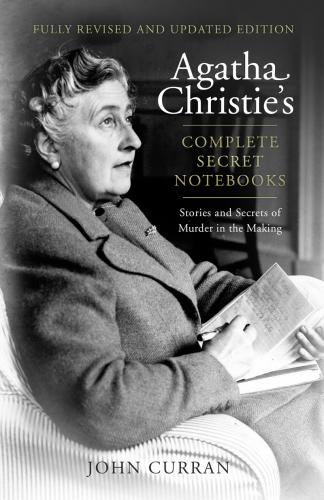The solution in the stage version is the earliest example of Christie altering her own earlier explanation. She was to do this throughout her career, giving extra twists to dramatisations of And Then There Were None, Appointment with Death and Witness for the Prosecution.
Some correspondence between Christie and Edmund Cork, her agent, in the summer of 1951 would seem to indicate that there were hopes of a revival, or to be strictly accurate, a first appearance of the play; but further developments in connection with a staging of the play, if any, remain unknown and it is clear that until Calgary in 2003 the script remained an ‘unknown’ Christie. The remote possibility that the script preceded the novel, which might have explained the unlikely choice for adaptation, is refuted by the reference in the opening pages of notes by the use of the phrase ‘Incidents likely to retain’.
There are amendments to the original novel as the entire play is set in Chimneys, where a weekend house party, arranged in order to conceal an important international meeting, is about to begin, and by the opening of Act I, Scene ii the murder has been committed. In a major change from the novel, Anthony Cade and Virginia Revel – in a scence foreshadowing similar in Spider’s Web and The Unexpected Guest – are the ones to find the body, although they say nothing and allow the discovery to be made the following morning. In effect, Act II opens at Chapter 10 of the book and from there on both follow much the same plan.
The Cast of Characters and Scenes of the Play from a 1928 script of Chimneys.
A major divergence is the omission of the scenes involving the discovery and disposal, by Cade, of the blackmailer’s body. In fact, the entire blackmail scenario is substantially different. But whether written or staged, it is an unconvincing red herring and it could have been omitted entirely from the script without any loss. Other changes incorporated into the stage version include the fact that Virginia has no previous connection with Herzoslovakia, an aspect of the book that signally fails to convince. The secret passage from Chimneys to Wyvern Abbey is not mentioned, the character Hiram Fish is dropped and the hiding place of the jewels is different from, and not as well clued as, that in the novel.
The notes for Chimneys are all contained in Notebook 67. It is a tiny, pocket-diary sized notebook and the handwriting is correspondingly small and frequently illegible. In addition to the very rough notes for some of The Thirteen Problems the Notebook contains sketches of some Mr Quin short stories, including notes for a dramatisation of the Quin story ‘The Dead Harlequin’. Overall, the notes for Chimneys do not differ greatly from the final version of the play, but substantial changes have been made from the original novel.
The first page reads:
People
Lord Caterham
Bundle
Lomax
Bill
Virginia
Tredwell
Antony
Prince Michael
Now what happens?
Incidents likely to retain – V[irginia] blackmailed
Idea of play
Crown jewels of Herzoslovakia stolen from assassinated King and Queen during house party at Chimneys – hidden there.
And twenty-five pages later an amended cast of characters:
Lord C
George
Bill
Tredwell
Battle
Inspector
Isaacstein
Bundle
Virginia
Antony
Lemaitre
Boris
The entire action of the play moves between the Library and the Council Chamber of Chimneys. Chapter 16 of the novel has a brief reference to visitors being shown over the house and it is with such a scene that the play opens:
Act I Scene I – The Council Chamber
Lord C[aterham] in shabby clothes – Tredwell showing party over. ‘This is the . . . .’ A guest comes back for his hat tips Lord C. Bundle comes – ‘First bit [of honest money] ever earned by the Brents.’ She and Lord C – he complains of political party Lomax has dragged him into. Bundle says why does he do it? George arrives and B goes. Explanation etc. about Cade – the Memoirs – Streptiltich … the Press – the strain of public life etc. Mention of diamond – King Victor – stolen by the Queen, 3rd rate actress – more like a comic opera – she killed in revolution
Despite the crossing-out and amended heading, the following passage appears in the script as Act I, Scene ii. It corresponds to Chapter 9 of the novel, although there it takes place in Virginia’s house. I have broken up the extract and added punctuation to aid clarity.
Scene II – The Same (Evening)
Act II Scene I
That evening Antony arrives first – then V. He says about a poacher – shots – They do go to bed early – no light except in your window … – not this side of the house. Then she talks about the man – his queer manner – didn’t ask for money – wanted to find out. Then discovery of body – she screams. He stops her – takes her to chair.
‘It’s all right my dear, it’s all right.’
‘I’m quite all right.’
‘You marvellous creature – anyone else would have fainted.’
‘I want to look.’
He goes, coming back with revolver.
‘Yes – stay.’
He asks her to look.
‘You are marvellous’
‘Have you ever seen him before?’
‘Have I – Oh! Why, it’s the man – he’s different. He had horn-rimmed glasses – spoke broken English.’
‘This man wasn’t … He was educated at Eton and Oxford’
‘How do you know?’
‘Oh, I know all right. I’ve – I’ve seen his pictures in the newspapers’
‘Have you ever had a pistol?’
‘No’
‘It’s [an] automatic.’ Shows her.
‘It’s got my name on it.’
‘Did you tell anyone – anyone see come down here?
‘Go up to bed.’
‘Shouldn’t I shut the window
